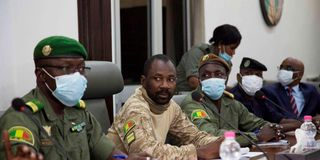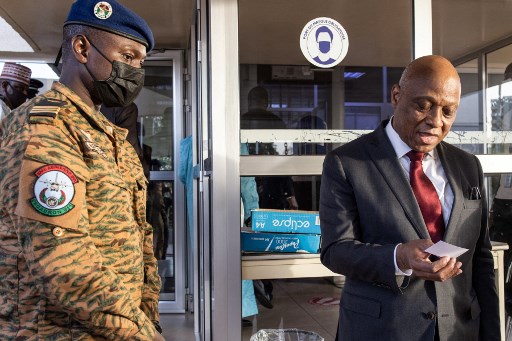Mali: New constitution to boost presidential powers, downgrade French

In this file photo taken on August 22, 2020 President of the CNSP (National Committee for the Salvation of the People) Assimi Goita (2nd L) prepares for a meeting between Malian military leaders and an ECOWAS delegation headed by former Nigerian president, in an aim to restore order after the military coup in Bamako.
Proposals to change Mali's constitution to enable the military-run West African nation to return to civilian rule would bolster the president's powers and reduce the status of the French language, according to a draft seen by AFP.
Constitutional change is one of a string of major institutional revamps launched by the military after it ousted Mali's last elected president in August 2020.
The junta's declared goal is to hold elections in February 2024 that would lead to the restoration of civilian rule.
Junta leader Colonel Assimi Goita, who was appointed transitional president in May 2021, formally received the constitutional draft on Monday. A first version, drawn up in October, had been sent back for further revision.
Goita hailed the draft as a "major" document reflecting the "profound aspirations of our people" and a "democratic renewal".
Despite several political parties questioning the need for a new constitution, Goita said the draft had been drawn up "without any obstacle."
The new constitution is supposed to be put to a plebiscite, scheduled in theory for March 19. But Goita made no comment on the timetable, amid widespread doubts about the date.
"If it receives public approval in a referendum, the document should govern the organisation and the working of the State and its institutions," he said.
The draft seen by AFP on Tuesday has yet to be officially published, but the document seen by AFP strengthens the powers of the presidency as compared with Mali's 1992 constitution.
The head of state, not the government, will "determine the policies of the Nation," appoint and fire the prime minister and ministers, and be empowered to dissolve the National Assembly, it says.
The landlocked Sahel state is one of the poorest and most volatile countries in the world, suffering a string of coups since gaining independence from France in 1960.
The 2020 putsch was triggered by anger within the military at failures to roll back a jihadist insurgency that has claimed thousands of lives, forced hundreds of thousands from their homes and inflicted devastating economic damage.
The government "is responsible to the president", as opposed to parliament as was the case previously, the draft text adds.
Proposing laws will be the prerogative of the president and the National Assembly, whereas this was previously the right of the government and MPs.
The president, who would be elected for five years and limited to two terms, would also have the right to order nationwide mobilisation for adults aged over 18.
The 1992 constitution and a draft drawn up in October 2022 described French as "the language of official expression", but the latest revised version promotes local languages, of which there are dozens, to "official" status.
"National languages are the official languages of Mali" while "French is the working language", according to the new draft.
The proposed change coincides with a row between the junta and France, which last year ended its anti-jihadist mission in Mali after the junta brought in Russian operatives described by Paris as Wagner mercenaries.
The new draft describes Mali as a "single, sovereign, independent republic," thus ruling out regional autonomy or self-rule in a country that is an ethnic mosaic.
It also describes carrying out a coup d'etat as an "imprescriptible crime," meaning an offence for which there is no time limit for prosecution. But those involved in 2020 military takeover would be covered by an amnesty.
Mali has been battling a security and political crisis since jihadist and separatist insurgencies broke out in the north of the country in 2012.
Jihadists affiliated with Al-Qaeda and the Islamic State group have escalated their operations into neighbouring Niger and Burkina Faso.
Thousands of civilians, police and troops have been killed across the region, and more than two million have fled their homes.





